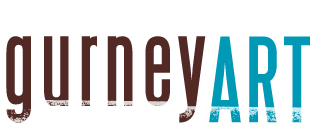Alex Gurney and 'Bluey and Curley'
Recently I came across this strip drawn by my dad and though it was done in the 1950's, it is relevant today.

My father Alex Gurney, was born in Portsmouth England in 1902. He and his mother migrated to Hobart when he was three months old. At school he found to his and his mates enjoyment he could draw caricatures of his teachers and others with quick likeness. His love of drawing continued all his life.
His parents insisted he had a 'proper job' when he left school and so was apprenticed to the 'Hydro' electrical authority in Tasmania. At night he studied Art at Hobart Technical School. During this time he had a number of drawings accepted by the Hobart Mercury, the Tasmanian Mail, The Melbourne Punch, the Bulletin and Smiths Weekly.
 ln 1926 he came to the mainland to try his luck as a full time black and white artist. He did numerous cartoons including 'Stiffy & Mo'. 'Daggs'. 'Ben Bowyang' and daily political cartoons. At the onset of World War I I, he created 'Bluey and Curley' a daily cartoon strip for the Herald and Weekly Times. Its popularity during the war years was incredible and it was circulated to all Australian forces overseas.
ln 1926 he came to the mainland to try his luck as a full time black and white artist. He did numerous cartoons including 'Stiffy & Mo'. 'Daggs'. 'Ben Bowyang' and daily political cartoons. At the onset of World War I I, he created 'Bluey and Curley' a daily cartoon strip for the Herald and Weekly Times. Its popularity during the war years was incredible and it was circulated to all Australian forces overseas.
The characters were classical larrikins, although loaded with human frailties, the pair were fearless in battle, imaginative, superbly adaptable and always capable of outwitting any German or Japanese who came their way.
Bluey was the older one, a bit henpecked and Curley was young and single but nothing too carnal. Sex and religion were taboo, but it was alright for the pair to be gamblers, boozers, layabouts, anti sergeant, anti officer, anti saluting and quite blissful about going absent without leave.
Dad was an official Australian War Correspondent and worked on location with our troops in the front lines. The three attended the victory parade in London and visited occupied Japan. It was the first cartoon to be radioed back home for publication.
My father was a genuine artist with a highly developed sense of the ridiculous. He loved to do big strips - the whole sky filled with whizzing bullets, exploding shells, total mayhem. Bluey and Curley would be there, totally impassive, usually talking about something else :
Blue (yawning) : What was that, thunder or bombs?
Curl : Bombs !!
Blue : Thank heavens. I thought it was going to start raining again!!
On the other hand, he was accurate about detail. All the uniforms were exactly right, as were the tanks, the guns and carriers, the jeeps. The scenes were just as they were: the mess huts, the tents, the parade grounds.
It took him at least six hours to draw each cartoon. And often many hours painfully thinking up the joke. After the war Bluey and Curley moved to civvie life. They never looked any older, but had a thousand different jobs and situations.Dad died in 1955 aged fifty two. The strip was continued after his death, but in my opinion never quite recaptured theoriginal spirit of the creator.
Norman Lindsay wrote in a letter to my father, "There's no doubt you've turned out the best comic strip in this or any other country. I owe you a deuce of a lot of hearty laughs. Humour is a precious thing. But you've done something more than hand out laughs. You've caught the spirit of something exclusively Australian: As Australian as Steele Rudd or Lawson. It is a hard sardonic spirit, and it rejects false sentiment and translated into any form makes for the best art."
Alex Gurney was inducted into the Melbourne Press Clubs Hall of Fame in October 2013.
—
The Melbourne Press Club launched a book on October 10th 2014 featuring the legends of the industry. It includes my father, cartoonist, Alex Gurney and my Grandfather Monty Grover who started the Melbourne Sun Pictorial.



 Margaret Gurney
Margaret Gurney